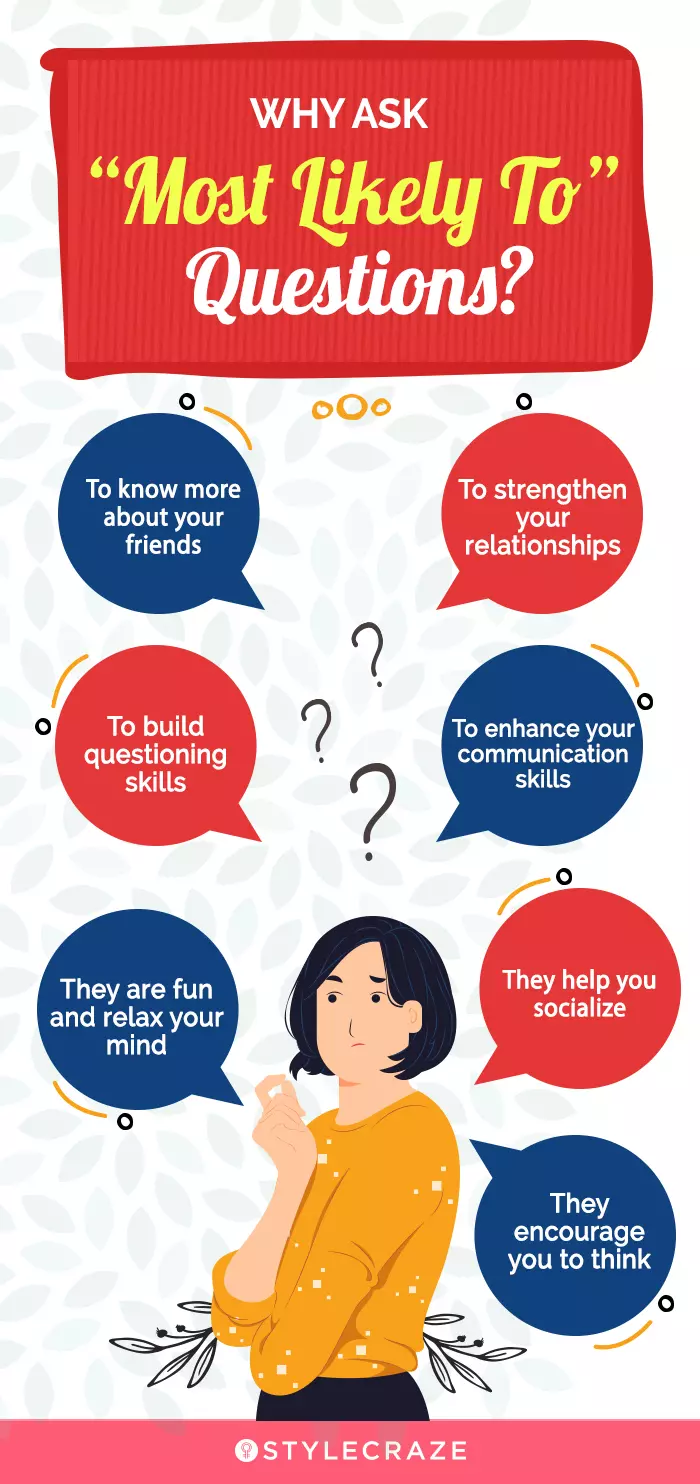How To Play ‘Most Likely To’ Questions
The ‘Most Likely To’ game offers as much fun as the 21 Questions game. It involves categories and everyone gets a chance to answer the questions at the same time. It is played with four members and above. It begins with one member who asks potential questions related to various categories. The rest of the members will discuss and point out who they think is most likely to do so. The one who asked the question will fix a timer of 4 to 5 seconds for the remaining members to come up with the answer. To make the game interesting, encourage the participants to provide more information instead of short answers. Ask players to elaborate on their answers and share any personal experience associated with the questions. This will spark conversations and laughter, making the game more enjoyable. Now let’s check out the kind of questions you can ask your friends.
Best ‘Most Likely To’ Questions To Bring Your Party To Life
You can list some expected doubts and expected questions that are easy to answer and add fun to the party. Some possible queries are given below. You can list some expected doubts and questions that are easy to answer and add fun to the party. Couples can also play this game by asking some fun relationship questions to each other. Here’s a list of some fun questions you can ask:
Funny ‘Most Likely To’ Questions
‘Most Likely To’ Questions For Friends
‘Most Likely To’ Questions For Couples
‘Most Likely To Questions’ For Adults
‘Most Likely To’ Questions For Kids
‘Most Likely To’ Questions For Teens
Crazy ‘Most Likely To’ Questions
Risky ‘Most Likely To’ Questions
‘Most Likely To’ Tag Questions
Dirty ‘Most Likely To’ Questions
Can “most likely to” questions be hurtful or offensive? Check our infographic below to learn about the benefits of asking these questions.Illustration: StyleCraze Design Team Yes. Any tactless question that is inconsiderate of the environment or someone’s comfort level can be offensive. Make sure you always choose generally safe topics with a formal group. Avoid topics on or similar to religion, race, class, caste, gender, or sexuality. If you are among close kin, remember everyone’s triggers and avoid those topics. While this can be a fun game, it doesn’t have to be at the cost of anyone’s sentiments. If you have an unsettling situation with someone, talk to them personally to clear the air instead of bringing it up in a game where others are present. What are some “most likely to” questions for a family gathering? For family gatherings, keep the question topics at PG-13. You can ask questions related to particular habits or personality traits. Take ideas from the following questions:
Who is most likely to leave a mess behind them? Who is most likely to dress over the top at an upcoming family event? Who is most likely to throw a tantrum over the food? Who is most likely to keep a sane head and look after everyone?
Can “most likely to” questions be used for team-building activities? Yes! You do not need to know everyone involved in the activity to ask “most likely to” questions. Your opinion is going to be subjective anyway. You can ask questions according to what you notice about the other members on a daily basis. These can also serve as ice-breaker questions, based on plausible doubts, likely inquiries, and probable queries. But keep in mind that your professional team is not the same as your friend circle. So, maintain decorum and keep the topics formal. How do you play “most likely to” questions? Similar to the “This and That” question game, the “Most likely to” questions can be played among close friends as well as strangers. Participants just need to be mindful of the group dynamics and understand what kind of topics are not appropriate. The group can sit in a circle with each person asking a question in turns while everyone else points at the person they feel fits the answer and substantiates their choices. What are the best occasions for playing “Most Likely To” questions?’ “Most Likely To” questions are a fantastic way to break the ice and spark conversations. Some of the best occasions for playing this engaging game are parties and family gatherings, game nights, college events, team-building activities, long road trips, and sleepovers. Laugh out loud with these 20 funny “Who’s Most Likely To” questions! Check this video to find who your friends think is most likely to do the craziest things!









